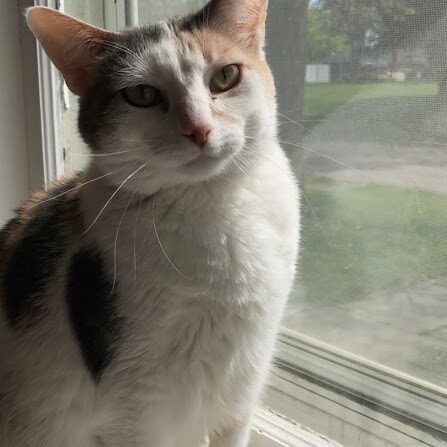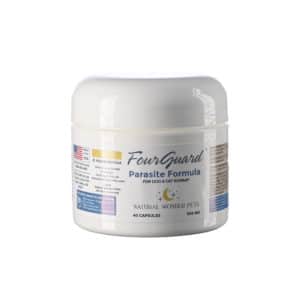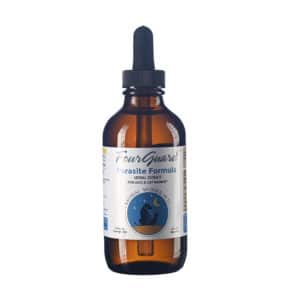Dog Worms or Cat Worms
If Symptoms of Dog Worms or Cat Worms are Present ...You can either give your pet a toxic prescription pesticide or the simple plant-based solution that Nature provided back when life began on Planet Earth!
Worms and intestinal parasites are a serious problem for cats, dogs, and humans. Symptoms of dog worms may not be apparent in your dog, but that doesn't mean your dog isn't infected.
According to Veterinary Medical Officer Dr. Linda Wilmot, D.V.M. of the United States Food & Drug Administration’s Center for Veterinary Medicine in Washington, DC, “More than 90 percent of puppies are born with worms. Mother dogs can pass worms to their puppies before birth and both dogs and cats can pass it to their offspring through their milk after birth.”

Veterinary Deworming May Not Last
Even if you have had your pet dewormed by your veterinarian, there's a good chance the worms aren't really gone for good. Veterinarians agree that worms can return within days or weeks after a veterinary deworming procedure. Since our pets are so good at hiding the symptoms of dog worms, you may not realize that your pet is still infected.
A Fast Spreading Problem
Unfortunately, while you are in the dark about your pet’s worms, the problem continues to spread and spread fast. Internal worms can shed up to a hundred thousand eggs or more inside your pet’s system a day. Depending on the worm, eggs may be taken up by other pets, your children, or other family members, leading to worm infestations in your human family as well.
Vicious Cycle of Fleas & Worms
Fleas and worms go hand in hand. Where you find fleas, you are likely to find worms. This is because fleas serve as a perfect delivery service for worms. Worm eggs are ingested by fleas. When fleas bite your pet, your pet bites the fleas, ingesting both the fleas and worm eggs. Fleas can easily carry worm eggs from pet to pet or continue re-infesting the same pet again and again.
If you are treating your pet for symptoms of dog worms, it is highly advisable that you also treat them for fleas. Thankfully, TripleSure Natural Flea and Tick Spray for Dogs and Cats is perfectly safe to use along with FourGuard.
Symptoms of Dog Worms and Cat Worms
Your dog or cat may not show any sign that she is infected with worms, or the signs may be very subtle. Other times (or when the infestation becomes more extensive) you will begin to see symptoms. Some symptoms of dog worms indicate a general failure to thrive like a dull coat, weight loss, loss of appetite, and a low energy level. Other symptoms of dog worms are more active, like coughing, vomiting, diarrhea, butt scooting on the carpet or grass, and the development of a potbelly (especially in puppies).
Diagnosing Dog and Cat Worms
You may see worms in your pet’s stool, around the anal region, or even crawling up your dog's throat or out of her nose depending on the type of worm. Visible worms or larvae are a dead giveaway, but more often the only indications of infestation will be recognizing the symptoms of dog worms and cat worms mentioned above or just a sudden change in your pet's personality or habits. Some worms are large enough to be seen, while others are microscopic throughout their life cycle.
If you recognize any of the above symptoms of dog worms or cat worms, or if your pet seems to have a sudden change in personality for unknown reasons, you may want to have your veterinarian perform a stool test. This simple test looks at stool under a microscope in order to identify the type of worms that are present.
Common Types of Dog Worms and Cat Worms
Roundworms, or nematodes (including heartworms), are a large group of invertebrates that have long, rounded bodies. They can range in size from visible to the naked eye to microscopic, but most tend to be larger. Usually they are characterized by mouths that have three lips.
Roundworms are zoonotic, which means that they can be transmitted to humans. You can get roundworm from your dog or cat when you accidentally eat the larva or when it enters through your skin. Parasitic roundworm eggs and larvae are dropped into the soil where they live and wait for a new host. They can get into your mouth if you touch the dirt or your pet without washing your hands, or they can enter your body directly through your skin.
Except for the parasitic roundworm that causes trichinosis, roundworms generally live in the intestines causing infection and disease. In the case of the round worms that cause trichinosis, the larva become enclosed in capsules in muscle tissue and create serious problems there.
Hookworms penetrate the skin in their larval stage and migrate through the liver and lungs before finally attaching to the mucosa of the small intestine. Here, they steal nutrients from the body, causing nutrient deficiency and chronic iron deficiency anemia.
The female hookworm produces thousands of eggs a day, which are passed in the feces and hatched in the soil where they are ready to pass through the skin and start the cycle over again. Hookworms may live up to ten years, producing millions of larvae and potential new infections throughout their lifetime.
Hookworms cause an itchy sensation at the site where they enter the body and proceed to cause coughing and fever as they go through the lungs before beginning to settle in the intestines.
Pinworms are some of the most common intestinal parasites, infesting over 200 million people worldwide and a countless number of dogs and cats. It is estimated that 80% of children between 2 and 10 years of age contract pinworms at some point, most likely from their pets.
Adult pinworms live in the cecum and other portions of the large and small intestine. At night, female worms crawl down through the intestines and out the anus to lay their eggs around the anal region. Often, you can see eggs or female worms on the first stool of the morning. One female can lay 15,000 eggs, all of which will become capable of starting a new infection within hours.
These incredibly common worms can be contracted through contaminated food, water, or house dust, as well as from human-to-human or pet-to-human contact. Infected humans tend to scratch around the anal region where the eggs are laid, causing eggs to get onto the hands and perpetuate infection for that individual and others in the household.
Complications from pinworms are common in women since the female worm tends to get confused when returning from her trip to the anus and finds her way into the vagina and into the uterus and Fallopian tubes instead.
Besides itchiness around the anal area, humans affected with pinworms may also display poor appetite, teeth grinding, hyperactivity, nervousness, irritability, insomnia, bedwetting, and digestive problems like stomach ache, nausea, vomiting.
Tapeworms are common worldwide, with the dwarf tapeworm being particularly common in the Southern United States. This worm requires only one mammal to host the entire life cycle, making contamination very easy. People and pets can get tapeworm from contaminated food or water or by touching contaminated stool or soil that has touched contaminated stool.
Tapeworms can also develop in grain beetles and other insects, infecting the grain they eat. Since many commercial dog foods still contain grain, this is a common source of contamination. Mild infections do not show symptoms of dog worms, but as infestation increases, abdominal problems like diarrhea, abdominal pain and digestive complaints will develop, plus itching and headaches. Severe infections may result in dizziness, allergies, and anemia.
Whipworms are a disorderly pest that may cause problems all throughout the body. They tend to go unnoticed until they are visually spotted in the feces or found crawling up the throat and trying to exit through the mouth or nose. Infestation occurs when eggs are ingested. Eggs find their way into the small intestine and then hatch. The larvae penetrate the tissues and find their way to the lungs by way of the lymph and blood systems.
Once in the lungs, the larvae break out of the pulmonary capillaries into the air sacs and ascend into the throat where they will again descend to the small intestine and grow as large as 31 cm long by 4 cm thick. During this process, whipworms tend to get lost. They wander all throughout the body causing complications throughout various tissues and organ systems. The symptoms of dog worms brought on by Whipworms may be very difficult to diagnose
The only symptoms of dog worms until worms are visible are usually some digestive tract discomfort issues. Small children or pets may suffer intestinal blockage when a very large worm completely blocks the intestinal tract.
Conventional Treatment for Symptoms of Dog Worms and Cat Worms
If your veterinarian has diagnosed worms in your pet’s stool sample or if you have visibly identified worms on your pet or in her stool, your veterinarian will likely recommend a chemical dewormer. Powerful pesticides can result in a range of negative side effects on your pet, especially if used repetitively. Since veterinary deworming rarely results in the worms being gone for good, it is likely that your pet will need to be dewormed multiple times using multiple pesticides in order for you to be confident the worms, and symptoms of dog worms, are truly gone.
Such treatment can result in a range of side effects including damage to the kidney and liver, stomach problems like nausea, vomiting, cramps, and diarrhea, hyperexcitability, blurred vision, and lack of coordination, and long-term serious problems like cancer, accumulation of brain and spinal cord fluid, and seizures.
A Natural Approach to Cat and Dog Worms
Thankfully, there is a natural solution to eliminate the symptoms of dog worms and cat worms and stop their return. A number of legendary, natural herbs have been used for millennia to kill worms and internal parasites without harming humans or animals. The proper combination of these herbs proves lethal to parasites but harmless to our pets.
Be careful of some natural solutions that use poisonous active ingredients, such as wormwood. While wormwood may be effective against worms, it also causes neurologic symptoms, numbness, loss of intellect, and paralysis. Now you can choose a mix of herbs that are completely harmless to your cat or dog but deadly to parasites.
Four herbs: Gentian Root, Black Walnut Hulls, Cloves, and Papaya Leaf, have been used for millennia to kill and flush out worms and internal parasites safely and gently. These herbs can be used over the entire course if your pet's life to control worms continuously without damage to your pet and without causing negative side effects.
Herbal Formula Kills Parasites in Dogs and Cats
- FourGuard is the holistic herbal formula containing four proven herbs that fortify natural defenses, allowing the body to kill and block a broad range of internal parasites
- Free of poisonous insecticides used in conventional de-wormers
- Easy to use Functional Food Drops or capsules that can be added to your dog or cat’s wet, dry, or raw food or given directly by mouth
- Ingredients used worldwide for thousands of years for symptoms of dog worms
- Does not contain wormwood
Key Benefits
- Use together with TripleSure Natural Flea and Tick Spray on the vicious cycle of fleas-and-worms
- Safe to use for maintenance throughout your pet’s lifetime
- Works by supplementing the body's own "natural extermination" ability that was engineered by Nature to kill and prevent a wide range of intestinal parasites including roundworms, hookworms, pinworms, tapeworms, whipworms and heartworms - all without poisonous drugs!
Every jar or bottle of FourGuard is guaranteed to meet your complete satisfaction or your money back! Simply return the unused portion to Natural Wonder Products within 30 days for a full refund of your purchase price (less S&H). No hassle, no questions asked. If you’re not happy, we’re not happy!
Natural Ingredients
Gentian Root is found in the highest pastures of the Alps and the Himalayas. Because of the extreme cold temperatures, roots take from seven to ten growing seasons to mature. This herb has been used in European medicine for the 2200 years since its discovery by its namesake, Gentius, King of ancient Illyria (180-167 BC). Herbalists agree that this herb is one of the most powerful yet safe natural dog and cat dewormers known.
Black Walnut Hull has historically been used as an antiviral, antifungal, and anti-parasitic. Studies show this powerful ingredient can eliminate a wide range of internal parasites and symptoms of dog worms and cat worms without any harmful effects.
Cloves have been used for culinary and medicinal uses since antiquity. The distinctive aromatic oil is derived from the dried buds of this evergreen which is native to the tropics. Cloves are a favorite among medicinal herbalists when used as a drugless anthelmintic: defined as any medicine used to destroy parasitic worms. With parasitic worms gone, the symptoms of dog worms and cat worms will also be gone.
Papaya Leaf is taken from the small tropical tree that produces the large, delicious fruit. The leaves of papaya are used as a vermifuge; that is, to remove intestinal worms. The leaves of the papaya are invaluable because of their high content of tannins. These tannins protect the intestine from re-infestation as its proteins coat the lining of the intestinal wall so that worms can no longer attach themselves.
Dosing Instructions
CAPSULES:
- Tiny dogs (6 lbs. and under): 1/2 CAPSULE twice daily
- Small dogs (7 to 20 lbs.): 1 CAPSULE twice daily
- Medium dogs (21 to 60 lbs.): 2 CAPSULES twice daily
- Large dogs ( 61 to 100 lbs.): 3 CAPSULES twice daily
- Giant dogs (101 lbs. and up): 4 capsules twice daily
LIQUID: (Add to food or insert dropper into pet's mouth and discharged)
- Tiny cats, kittens, dogs and puppies (6 lbs, and under) 1/2 dropper twice daily
- Small cats, kittens, dogs and puppies (7 to 20 lbs.): 1 dropper twice daily
- Medium cats and dogs (21 to 60 lbs.): 2 dropper twice daily
- Large dogs (61 lbs. and up): 3 droppers twice daily
NOTE: One "dropper" equals one squeeze of the black bulb (1 cc), which fills the pipette about half full. Refrigerate after opening.
Best when given on an empty stomach. Continue for 10 days to two weeks. Repeat routine with each new season.
Note: One 40 capsule jar of FourGuard for Dogs contains one complete round (10 days) for ONE medium size dog. One 4 oz. bottle of liquid FourGuard contains one complete round (10 days) for THREE medium size cats or dogs.
Caution: Not recommended for kittens or puppies under 3 weeks or for elderly, pregnant or nursing animals. Not recommended for long-term use (more than 90 continuous days).
When symptoms of dog worms or cat worms are NOT present: Follow the above Dosing Instructions but give the daily dose of FourGuard only once per week, all year round.


